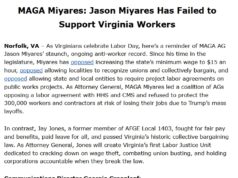 Nixon going to China has become one of the biggest cliches in politics. But like many cliches, it reveals a fundamental truth: the power of a politician playing against his own stereotype — and changing history in the process.
Nixon going to China has become one of the biggest cliches in politics. But like many cliches, it reveals a fundamental truth: the power of a politician playing against his own stereotype — and changing history in the process.
Terry McAuliffe presently faces a problem and an opportunity that both can be solved by his own “trip to China.” The problem is that his reputation is that of a big-money inside-the-Beltway fundraiser. By sheer coincidence, the opportunity also involves campaign cash — the Star-gate scandal that is presently eating both Bob McDonnell and Ken Cuccinelli alive. This whole scandal has exposed how weak and ineffective Virginia’s campaign finance laws really are — and how unlikely it is that Republicans will be the ones to change them.
The solution is one that Terry’s campaign has just begun to hit on — make him the leader who finally brings real campaign finance reform to the Commonwealth. What better person to lead that charge than one of the great fundraisers in recent political history? By making this a major campaign issue, Terry can leave his past behind him and embrace a future as the reformist governor that Virginia so desperately needs.
And this is one of those happy instances where good policy also represents good politics, since every mention of the legal and ethical woes of the current Republican governor and the AG who seeks to replace him only helps make the Democrats’ case.
I’ve often questioned why more politicians don’t embrace the issue of campaign finance reform. Perhaps it is because they are listening to pollsters who rarely find the issue cited as one of voters’ major concerns. But that misses a critical point: knowing that a candidate is a genuine champion for reform gives voters a positive feeling about that candidate — a reputational boost that adds more credibility to the rest of whatever that candidate says and does. Such a boost would help Terry tremendously right now.
If the Nixon analogy is too dated for you, try John McCain. His reputation was damaged in 1989 when he was named one of the “Keating Five”, a group of Senators caught trying too hard to help a Savings & Loan CEO who had given them handsome campaign contributions.
Once cleared of improprieties, McCain used the incident as a launching pad for what became his very successful push for campaign finance reform — the McCain-Feingold law. Within a few years, he had changed his reputation from that of a deal-maker to that of a reformer — a title that he rode all the way to a presidential nomination.
Terry, by contrast, has no scandals in his background (contrary to all the baseless bloviation you may hear emanating from tea party circles). But that doesn’t change the fact that high-dollar fundraising is not a profession that gives most voters a warm and fuzzy feeling.
The best way to change one’s old image is to simply move forward and leave it behind. People rightly care less about your past (as long it was clean, as Terry’s has been) and more about our future.
So, adding to his excellent message about jobs, economic development, energy, education and transportation, it would help to add the unifying goal of a clean government that works for all the people — not just the highest bidders. Terry made a very smart move recently in responding to the Star-gate scandal by calling for a gift ban.
I strongly encourage his campaign to expand on that promising start with a more fully fleshed out proposal to finally bring campaign finance reform to a state that desperately needs it. We’ve let the fat cats run Virginia for way too long. A campaign to end that situation could excite Virginians in a way that we haven’t seen in a very long time.





![Monday News: Trump’s Lunacy Pushes China, Russia, India, etc. Together; “Happy Labor Day. Donald Trump and Elon Musk Are Screwing Workers.”; “Where is the [media’s] intense focus on Trump’s failing health?”; ““Trump says he is not a dictator. Isn’t he?”](https://bluevirginia.us/wp-content/uploads/2025/09/montage0901-238x178.jpg)








![Monday News: Trump’s Lunacy Pushes China, Russia, India, etc. Together; “Happy Labor Day. Donald Trump and Elon Musk Are Screwing Workers.”; “Where is the [media’s] intense focus on Trump’s failing health?”; ““Trump says he is not a dictator. Isn’t he?”](https://bluevirginia.us/wp-content/uploads/2025/09/montage0901-100x75.jpg)